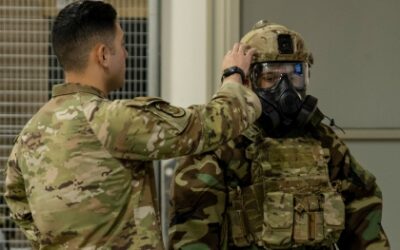According to VA, at least one aspect of its new Oracle-Cerner electronic health record (EHR) system is showing demonstrable improvement–a reduction in the number of times the system as a whole has been offline and inaccessible.
Concurrent Steroids Do Not Reduce Cancer Drugs’ Effectiveness
Immune checkpoint inhibitors (ICIs) have played a crucial role in the field of immuno-oncology over the past decade, substantially improving the prognosis of different cancers.
Nearly 20% of Veterans Showed Decline During Pandemic
While most U.S. veterans maintained or improved physical and mental function a year into the COVID-19 pandemic, almost 20% showed a decline, according to a new study.
Higher Dose Flu Vaccines Don’t Reduce Cardiopulmonary Events
Higher dose influenza vaccines don’t appear to reduce risk of cardiopulmonary events during periods of increased, local flu activity, according to a recent study.
Immune Suppressive Drugs Increase Risk for Severe COVID-19
The risk of severe COVID-19 despite vaccination is substantial in patients taking immune-suppressive drugs, and their risk is much greater than patients with inflammatory diseases.
Prostate Cancer Outcomes Not Affected by FSH Levels
The standard treatment for advanced prostate cancer (PC) is androgen deprivation therapy (ADT), usually delivered via a luteinizing hormone-releasing hormone (LHRH) agonist.
Toxicities From PARP Inhibitors for Prostate Cancer
Poly ADP-ribose polymerase inhibitors (PARPis) are an important class of therapeutics for metastatic castration-resistant prostate cancer (mCRPC),
Black Veterans 50% Likelier to Get Prostate Cancer Diagnosis on First Biopsy
Black men are more likely than non-Hispanic white men to develop and die from prostate cancer, yet not much data exists that is specific to prostate-specific antigen (PSA) screening protocols by race.
With High Awareness of Long COVID, Researchers Put Spotlight on Long Flu
Clinicians are well aware of long COVID, the enduring health conditions caused by the SARS-CoV-2 virus’ ability to attack multiple organ systems.
Oral Antiviral Drug Paxlovid Reduced Only Some Post-COVID-19 Conditions
Nirmatrelvir-ritonavir, an oral antiviral drug used to treat COVID-19, only appears to reduce some post-COVID-19 conditions, such as combined thromboembolic events, according to a recent study.
War on Terror Created High Rates of Ocular Trauma in U.S. Servicemembers
The rate of combat ocular trauma in Operations Iraqi Freedom and Enduring Freedom exceeded that of any past U.S. conflict. A new study looked at the long-term effects of the devastating battlefield injuries.
Emerging Chemical Threats Affect Eyes Differently, Require Special Care
As chemical agent exposure remains a threat to military servicemembers, it’s important to consider that each chemical agent affects the eye differently and requires appropriate treatment, according to a recent review article.
Homeless Veterans More Likely to Receive Risky Benzodiazepine Prescriptions
Despite an elevated risk of mental illness and substance use disorder in most homeless populations, a scarcity of research exists on the use of psychiatric medications and understanding of prescribing practices among providers for these populations.
Multilevel Intervention Aligns Colorectal Cancer-Screening Use With Benefit
Each year, the VA diagnoses some 4,000 new cases of colorectal cancer (CRC) in veterans. Colorectal cancer screening can help detect cancer early, when it is most treatable. But the benefits of screening in older adults varies by individual, according to a new study.
Legislators Raise Concerns About Lack of Background Checks at VA
VA apparently lacks the personnel needed to complete timely background checks on all new staff, resulting in employees going to work at VA hospitals without ever being fully vetted, according to a legislator.
VA Healthcare, Fourth Mission Face Stresses From Continued Climate Change
With a worsening climate crisis, VA expects to be called upon more and more to implement its fourth mission—to act as a backstop for the nation’s overall healthcare network during times of emergency.
Telehealth Offers Promising Alternative to Traditional Sleep Medicine Care
Insufficient and disturbed sleep, as well as clinical sleep disorders such as obstructive sleep apnea, shift work disorder and nightmare disorder, are highly prevalent in the U.S. military and can result in increased accident risk and diminished military readiness.
Veterans Treated in VAMCs for Some Common Conditions Had Better Outcomes
Outcomes were better for some common conditions among veterans treated in VA hospitals compared to community care, but the tradeoff often was higher resource use.
A great leader takes people where they don’t necessarily want to go but ought to be
I was saddened to learn of the passing of first lady Rosalynn Carter. She and President Jimmy Carter were a leading political team during a particularly turbulent time in America. Although the Carter presidency was marred by the energy crisis of 1979 and the Iran hostage crisis, which likely limited Carter to one presidential term, the husband-wife team had a remarkable list of accomplishments during their four years at the White House. Carter made some difficult and unpopular decisions during his presidency. He pardoned all Vietnam War draft dodgers, returned the Panama Canal, established the Departments of Energy and Education and shepherded, arguably, the most significant talks regarding Middle East peace through the Camp David Accords.
No Racial Differences in DLBCL Treatment Within VA Healthcare System
No statistically significant racial differences in diffuse large B-cell lymphoma (DLBCL) outcomes were found for patients treated within the VHA, according to recent research.
Very Elderly Patients Fare Much Worse When Treated for DLBCL
Diffuse large B-cell lymphoma (DLBCL) becomes much more difficult to treat in older patients, according to a new study suggesting that more adults of advanced age be included in clinical trials for new agents.
Despite Disparities, Making a Difference for Veterans With Relapsed DLBCL
DURHAM, NC—Recent Food and Drug Administration approvals of chimeric antigen receptor (CAR) T cell therapies and novel immunotherapies have helped to significantly improve outcomes for patients with relapsed and refractory diffuse large B cell lymphoma (R/R DLBCL)....
More Diverse Dataset Raises Questions about MGUS Risk Models
Patients with monoclonal gammopathy of undetermined significance (MGUS) have been thought to have a less than 1% chance of progressing to multiple myeloma as long as their M-protein levels are below 1.5 g/dL.
Lower Relapse Rates Suggest Limited Value for Prophylaxis in DLBCL
Up to 40% of patients with diffuse large B-cell lymphoma (DLBCL) relapse or progress following first-line chemoimmunotherapy.
For CLL, BTK Inhibitors Appear to Extend Time to Next Line Most
JACKSONVILLE, FL—As treatment options for chronic lymphocytic leukemia (CLL) multiply, physicians face an increasing array of sequencing options but have little guidance from clinical trials of the most effective order given each patient’s specific disease...
All WWII Veterans Now Eligible for No-Cost VA Care, Including Long-term Care
All World War II veterans now are eligible for no-cost VA healthcare, medical services and nursing home care, the VA announced shortly before Veterans Day.
Knowing Seasonality of Wartime Wound Infections Can Aid Effective Treatment
Battlefield-related wound infections complicate recovery from combat casualties. A new study described what pathogens are more likely to cause morbidity at what times of the year to help better manage the infections.
New Factbook Reveals Veteran Trends, Including Mental Health, Labor Market
U.S. military veterans are declining as a percentage of the population and are, on average, older, more likely to be male and less racially or ethnically diverse than the overall nonveteran population, reports a new factbook that sheds light on demographics, mental health and labor market outcomes.
Surgery Is Better Treatment for Primary Aldosteronism
Even though primary aldosteronism (PA) is one of the most common causes of secondary hypertension, the comparative outcomes of targeted treatment often are unclear.
Consensus Documents Answers Some Questions on Carotid Stenosis
Many national/international guidelines provide recommendations on management of patients with asymptomatic (AsxCS) and symptomatic (SxCS) carotid stenosis. Several questions remain unanswered, however, according to a new report.






